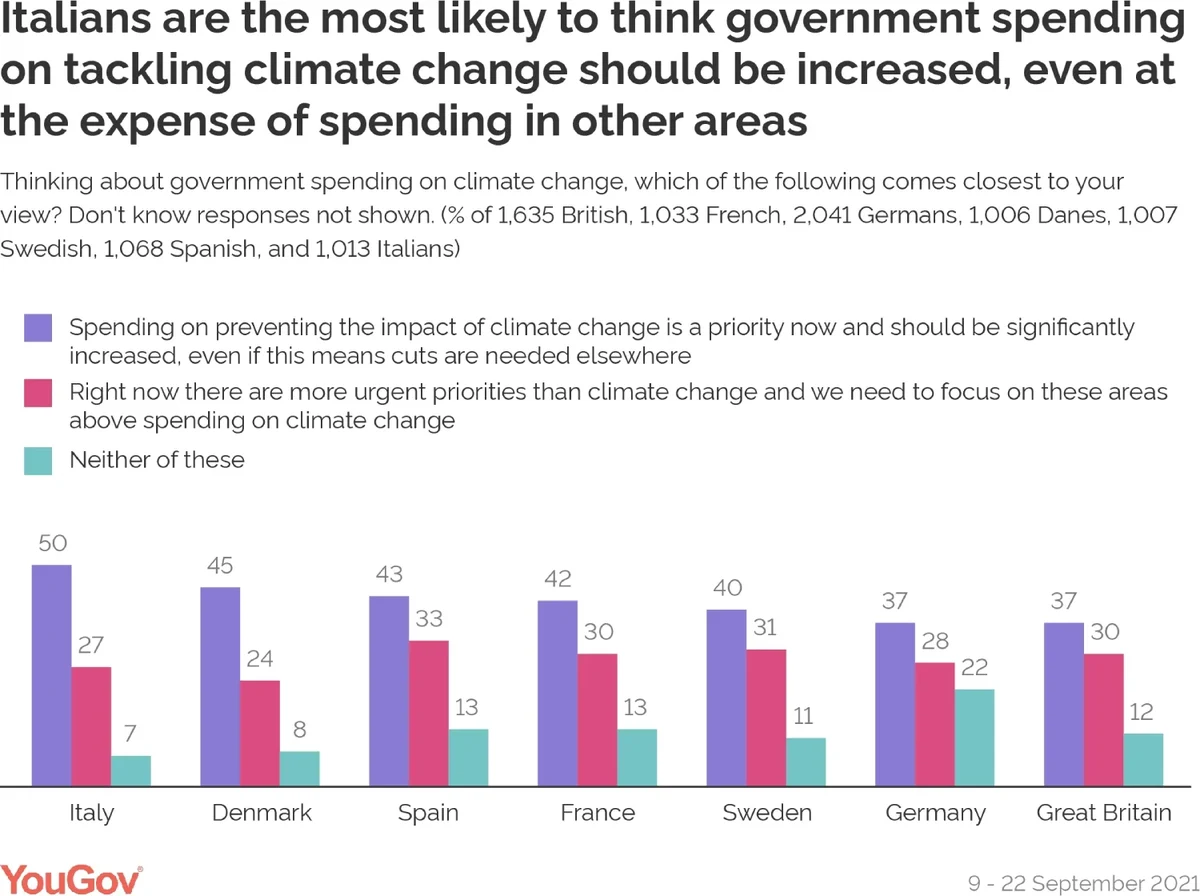World leaders are set to descend on Glasgow at the end of the month for COP-26, a global summit on measures countries could take to combat climate change. YouGov's latest Eurotrack survey looks at what Europeans in seven countries think of the summit’s chances of success, as well as wider attitudes to climate change.
Most are worried about climate change, but also think there is still time to fix things
Climate change is a sizeable concern across the countries studied. A majority of adults in Italy (84%), Spain (79%), France (79%), Germany (70%), Denmark (68%), Sweden (66%) and Britain (65%) all say they are worried about climate change and its effects.
Italians and the French are the most pessimistic about what can be done to tackle climate change, with one in five (19% and 20% respectively) saying that it is already too late to avoid the worst effects. Spaniards have the most positive outlook, with just 1 in 11 (9%) saying it is too late, and three quarters (73%) saying that the worst effects can still be avoided if drastic actions are taken.
Swedes are the most likely to think current actions are enough, with 1 in 6 (17%) saying that the steps currently being taken are sufficient to avoid the worst effects of climate change – Sweden is a leader in climate change action and is a frontrunner in the Climate Change Performance Index, thanks to its climate change policies. However, according to the Index no country is doing enough to prevent dangerous climate change, with no country achieving a 'very high' rating.
Countdown to COP-26
While COP-26 is the most major climate change event in the last couple of years, awareness of the conference is low across all countries polled. Britons and French people display the highest levels of awareness, but even here just a quarter (27% and 26% respectively) had heard a great deal or fair amount about COP-26 at the time the survey was conducted in mid-September. Awareness was lowest amongst the two Nordic countries, with just 6% of Danes and 7% of Swedes saying they have heard about the conference.
Despite the importance of the issue, and the involvement of the most powerful world leaders in seeking a solution, a majority in all seven countries think the conference is unlikely to result in any significant action being taken. Germans are the most pessimistic about what the conference can achieve, with 64% saying significant action is unlikely.
Can individuals make an impact on climate change?
Although the public have little confidence that COP26 will result in significant action, they are sure that it is within the power of governments to make an impact on climate change. In all countries, at least seven in ten think governments, as well as businesses, can have a big or fairly big impact on tackling climate change. Italians and Spaniards are most confident in this view – 84% of Italians say governments can have a big impact, while 86% of Spaniards think the same of businesses.
While the conference will focus on actions governments can take to affect global warming, can individuals also make a difference? The seven countries polled are split on the role individuals can play. Italians are the most confident that people themselves can make a difference, with three quarters (75%) say that individuals can have a big or fairly big impact. Danes are the least optimistic, with only 43% thinking people can make much of an impact at the individual level.
Majority think climate change should be a government spending priority
One of the key criticisms of governments in their commitment to tackling climate change is that they have not invested enough in finding solutions. Particularly in the wake of the coronavirus, the defence has been that the public would rather government spending was focused on other areas, but the latest Eurotrack data shows that this is not the case.
In all countries, the proportion of adults who feel climate change needs to be treated as a priority in terms of government spending outweighs the proportion that think spending on other areas should be more urgent. The gap is biggest in Italy, where half (50%) think climate change spending should be a priority, almost double the proportion that think other areas are more urgent than climate change (27%).

See full results here








